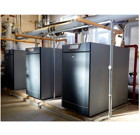Ideal Commercial Boilers warns about forthcoming legislation

With less than 12 months to go before the Government’s new energy bill comes into effect, Ideal Commercial Boilers is urging property investors and landlords to act now to get their properties up to standard and avoid lost revenues.
From 1 April 2018 energy efficiency regulations in non-domestic buildings will mean that landlords of commercial rented properties — including public sector landlords — cannot grant a tenancy to new or existing tenants if their property has an EPC rating of E or below. And, from 1 April 2023, landlords must not continue letting a non-domestic property if that property has an EPC rating of band F or G.
A report from global real estate services firm Cushman & Wakefield estimates that nearly 20% of commercial properties in England and Wales could fall short of the new energy standards.
Darren Finley, chief commercial officer at Ideal Commercial Boilers, said, ‘It is important to act now rather than wait for the changes to come into force.
“There is mounting pressure to meet the new energy standards, particularly where tenancies are due for renewal in the first quarter of 2018. Commercial landlords and property developers who are still heating their buildings with older boilers and inefficient systems, will end up losing out. Acting before April next year means they can benefit from the potential paybacks from the use of the technology and the associated energy savings earlier.
‘While replacing an inefficient boiler with an efficient one is the obvious solution, a wide range of technology and maintenance measures can contribute to an improved EPC rating. We would urge landlords to work with specialist contractors and consider the benefits of routine inspections protecting the whole heating system, as well as adopting preventative maintenance, monitoring gas bills, introducing controls and water treatment.’
Financial schemes are available to help offset the cost of increasing energy efficiency ratings and in many cases, enabling commercial landlords to offset the cost of the equipment through savings in energy bills. Once the equipment has been paid for, they have the option to make their rental proposition more attractive by increasing rental margins or passing the saving on to tenants.







